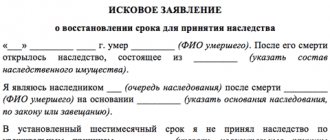Time to open inheritance
According to Art. 1113 of the Civil Code of the Russian Federation, inheritance opens with the death of a person or with the entry into force of a decision declaring him dead. Opening time is important because it is associated with:
- circle of legal successors;
- the composition of the hereditary mass formed at a certain point in time;
- the beginning of the period for filing claims, issuing certificates of rights to inheritance, documents on its acceptance, the emergence of rights and obligations of heirs and other persons;
- commencement of actions to protect the hereditary mass;
- regulatory legal acts applicable to inheritance legal relations.
With the opening of an inheritance, not only inheritance legal relations arise. Other norms of law are associated with this legal fact:
- Persons present when drawing up a will (notaries, translators, witnesses, executors, persons signing the document instead of the testator) do not have the right to disclose the information contained in the document before the opening of the inheritance.
- A will cannot be declared invalid if the inheritance is not opened.
- The legatee can exercise his right within 3 years from the date of death of the person.
- Heirs are persons who are not included in the legal successors, but who are disabled at the time of the death of the testator, and were dependent on the latter for at least a year before the death of the testator and lived together.
- You can accept inherited property within 6 months from the date of opening of the inheritance.
- When opening an inheritance on the day of a person's possible death, the six-month period is calculated from the date the court decision comes into force.
- When opening an inheritance, the common shared property of the legal successors arises, if the property is not distributed between them.
- On the day of death of the person, the market value of the estate is determined.
According to Part 1 of Art. 1114 of the Civil Code of the Russian Federation, the time for opening an inheritance is the day of death of the testator. In this case, the hour of death does not matter, only the calendar day.
For example, persons who died at different times, but on the same calendar date, according to the principle of hereditary succession, do not inherit each other’s property, since they are considered to have died at the same time. In a situation where one testator dies, for example, at 23.58 hours, the other - at 00.02 hours. the next day, the inheritance is opened on different days.
Article 1153 of the Civil Code of the Russian Federation. Methods of accepting an inheritance (current version)
In order to confirm the actual acceptance of the inheritance by the heir, in particular, a certificate of residence with the testator, a receipt for payment of tax, payment for living quarters and utilities, a savings book in the name of the testator, a passport of a vehicle that belonged to the testator, an agreement can be presented contracts for repair work and similar documents.
Thus, the list of actions given in paragraph 2 of the commented article is open and can be supplemented by any other lawful actual actions that can create a presumption that the heir has an intention to accept the inheritance by performing such actions. This means that if the heir, for example, paid the testator’s debts at his own expense, then it is assumed that he did this not out of altruistic motives, but with the goal of expressing in this way his will to accept the inheritance. However, this presumption may be rebutted, with the burden of rebutting it resting on the person concerned.
In some cases, the heir could perform individual actions indicating the actual acceptance of the inheritance, without having the intention to accept it. The Plenum of the Supreme Court of the Russian Federation in paragraph 37 of Resolution No. 9 of May 29, 2012 “On judicial practice in inheritance cases” explains that an heir who has committed actions that may indicate acceptance of the inheritance (for example, living together with the testator, paying debts testator), not for the acquisition of an inheritance, but for other purposes, has the right to prove that he has no intention to accept the inheritance, including after the expiration of the period for acceptance of the inheritance (Article 1154 of the Civil Code of the Russian Federation), by presenting the relevant evidence to the notary or by applying to the court with an application for establishing the fact of non-acceptance of inheritance. In addition, the fact of non-acceptance of the inheritance by the heir can be established after his death upon the application of interested parties (other heirs who accepted the inheritance).
3. Special subjects of hereditary succession are hereditary funds. Federal Law of July 26, 2021 N 201-FZ “On Amendments to the Federal Law “On the Enactment of Part Three of the Civil Code of the Russian Federation” introduced a new type of legal entities such as funds, which were called “hereditary funds” (amendments come into force on September 1, 2021, with the exception of certain provisions for which other deadlines are provided). Their introduction expands the ability of citizens to dispose of their property in the event of death, since the inheritance fund will be created and function after the death of the citizen-testator in accordance with the conditions that he himself determines.
In particular, Art. 50.1 of the Civil Code, which is called “Decision on the establishment of a legal entity,” was supplemented by clause 4. According to this paragraph, in the case of the creation of an inheritance fund (Article 123.20-1 of the Civil Code), the decision on the establishment of an inheritance fund is made by a citizen when drawing up a will and must contain information on the establishment of an inheritance fund after the death of this citizen, on the approval by this citizen of the charter of the inheritance fund and the conditions for managing the inheritance fund, on the procedure, size, methods and timing of the formation of the property of the inheritance fund, persons appointed to the bodies of this fund, or on the procedure for determining such persons .
From September 1, 2021, Federal Law No. 259-FZ of July 29, 2021, supplemented the commented article with a new clause 3, which established the procedure for accepting inheritance from an inheritance fund. This procedure is provided for in paragraph. 2 p. 3 art. 123.20-1 Civil Code of the Russian Federation. It says that when creating an inheritance fund and accepting the inheritance, the notary is obliged to issue the fund a certificate of the right to inheritance within the period specified in the decision on the establishment of the inheritance fund, but no later than the period provided for in Art. 1154 of this Code. If the notary fails to fulfill these duties, the inheritance fund has the right to appeal the notary’s inaction.
Describing the features of hereditary funds as legal entities, it is necessary to point out that subparagraph 1 of paragraph 7 of Chapter. 4 of the Civil Code in accordance with the Federal Law of July 26, 2021 N 201-FZ “On Amendments to the Federal Law “On the Entry into Force of Part Three of the Civil Code of the Russian Federation” was supplemented by Art. Art. 123.20-1 - 123.20-3. According to paragraph 1 of Art. 123.20-1 of the Civil Code, an inheritance fund is recognized as a fund created in the manner prescribed by this Code, in pursuance of a citizen’s will and on the basis of his property, which carries out activities to manage the property of this citizen received by inheritance indefinitely or for a certain period in accordance with the terms of management of the inheritance fund . And in paragraph 2 of this article it is said that an inheritance fund is subject to creation after the death of a citizen who provided for the creation of an inheritance fund in his will, upon an application sent to the authorized state body by a notary in charge of the inheritance case, with an appendix to the application drawn up during the life of the specified citizen his decision on the establishment of an inheritance fund and the charter of the fund approved by this citizen and after its creation is called for inheritance by will in the manner prescribed by Section V of this Code.” Thus, the provisions of the legislation on the inheritance fund are aimed at creating a special legal regime for the testator’s property that is predetermined and not included in the estate, bypassing the mandatory rules of inheritance law. Moreover, the testator has a choice: either to limit the activities of the inheritance fund to a certain period of time, or to make it perpetual.
Time of opening of inheritance in a court decision
If a person is declared dead by a court, the inheritance is opened on the day the decision comes into force or on the date of expected death established during the trial (if the disappearance is associated with an accident or with a situation that threatened the life of the testator).
To recognize a person as dead, certain circumstances provided for in Art. 45 Civil Code of the Russian Federation:
- for 5 years there is no information about the place of residence of the person;
- if the disappearance of the latter is associated with a situation that threatened death - in the absence of information about the person during the last 6 months;
- in the event of the disappearance of a serviceman or civilian during hostilities - no earlier than 2 years after the completion of such actions.
Thus, a necessary condition for the emergence of inheritance relations is the presence of one of the legal facts:
- death of the testator;
- declaring a person dead by court decision.
Time
The time of opening of the inheritance is...
- day of death (according to medical certificate);
- the day the court decision entered into legal force or the day of the expected death indicated in the court decision (if the citizen is declared dead by a court decision).
What is the time, the moment of opening the inheritance
The time for opening an inheritance is determined depending on the basis for the opening:
- in the case of biological death, the day of death indicated in the medical death certificate is recognized;
- if the fact of death is established - the day specified in the court decision;
- in the case of declaring a citizen dead - the day the court decision enters into legal force.
If the participants in the process appeal the decision of the court of 1st instance in an appeal, then the procedural document gains force based on the results of the hearing of the case in the appellate court.
If a citizen declared dead went missing under circumstances that threatened his life, the court may establish the expected date of his death. Each case is considered by the court individually. The basis of the court decision is categorical evidence of the facts stated in the claim.
Example. The testator has gone missing. On the eve of his disappearance, strangers threatened him with physical harm. Contacting law enforcement agencies was unsuccessful. Six months later, the man's body was still not found. Relatives of the missing person went to court. The man was declared dead. The court decision came into force on March 15, 2017. Based on the judicial act, the relatives received a death certificate.
Is there a deadline for accepting an inheritance?
According to the law, a period is a certain period of time during which certain actions must be performed. In the inheritance procedure, the term disciplines the participants in the relationship, provides guarantees of the inviolability of property rights, and its importance is important. Article 1154 of the Civil Code of the Russian Federation indicates that an inheritance is accepted within 6 months from the date of opening of the inheritance, which is counted from the date of death of the person. The notary accepts the application expressing the will of the heir during this period. Acceptance of the inheritance in fact occurs within the same period, and from the day the inheritance is opened, the heir must perform actions that indicate the acceptance of property from the deceased.
It is believed that such a period is sufficient for the heirs of the deceased citizen to decide whether to receive the inheritance or refuse it. An application submitted after the deadline has expired is not recognized and does not confirm the fact of acceptance of the inheritance. To protect rights in such a situation, the heir must file a claim in court. If during the proceedings it is recognized that the deadline was missed for a good reason and there are documents confirming this circumstance, the state body will restore the deadline by decision.
Documents confirming the time of opening of the inheritance
The time of opening of the inheritance is confirmed by a death certificate issued by the registry office or local government authorities of the locality (in the absence of a registry office) on the basis of a forensic medical report or a court decision. If the death occurred during hostilities, the opening time is the day specified in the notice.
There are situations when registry office employees, when issuing a death certificate, make a mistake in the personal data of the testator. It is necessary to re-apply to the place where the certificate was issued and provide other documents proving the identity of the deceased: driver’s license, insurance policy, birth certificate and others.
Place of opening of inheritance at the place of residence of the person...
The beginning of the procedure for establishing an inheritance case and notifying all potential successors begins with the submission of an application to enter into an inheritance or renounce it. The successor cannot submit an application to any notary office, only at the place where the inheritance was opened.
Sample application for opening an inheritance case
There are situations when the testator lived at one address, was registered in another place, and the property belonging to him is located in a neighboring region.
To eliminate confusion, the legislator established that the place of opening of the inheritance is the last permanent place of residence of the testator.
The assignee documents the location of the opening:
- housing department certificate;
- checking out books from home;
- certificate from the Federal Migration Service regarding deregistration.
...at the location of the inherited property
If the testator lived for a long time outside the Russian Federation, or his place of residence is unknown, the inheritance is opened at the location of the inherited real estate. In the absence of such objects - at the location of the movable property or at the price of part of the inheritance mass.
The appraisal documents will be required by the notary. How is the value of property and, therefore, the valuable part of the inheritance determined? What matters is the market value of each property at the time of the death of the testator. The value is quite relative and also depends on the location of the inheritance (this applies to a greater extent to real estate). The legislator did not specify in what sense the greatest value is determined. As a rule, we are talking about a material indicator, but inherited property can also constitute cultural value.
Sometimes the place of permanent residence of a person and the place of opening of the inheritance do not coincide. For example, a citizen of the Russian Federation permanently resided abroad, and his property is located on Russian territory. In this case, legal successors should contact a notary at the location of the property. If we are talking about minors or incompetent testators, the place of opening of the inheritance is the place of residence of their representatives.
Difficulties in establishing the place of opening of inheritance often arise. Eg:
- the legal successors do not know where the testator recently lived;
- it is impossible to determine where the most valuable hereditary objects are located;
- the house register is lost, and so on.
These and other issues are dealt with in court.
Sample application for establishing the place of opening of inheritance
How to establish the fact of the place of opening of inheritance in court?
Lawyer Antonov A.P.
Inheritance rights to the property of citizens who died starting from 01/01/2015 are formalized by any notary in the territory of the notarial district of the subject of the Russian Federation at the place of opening of the inheritance (clause 1 of Article 1153, clause 1 of Article 1162 of the Civil Code of the Russian Federation; clauses 1.3, 1.4 Methodological recommendations, approved by the decision of the FNP Board of March 25, 2019, protocol No. 03/19). As a general rule, the place of opening of the inheritance is determined by the notary at the last place of residence of the testator (Part 1 of Article 1115 of the Civil Code of the Russian Federation; Clause 2.1 of the Methodological Recommendations). Indisputably, as the last place of residence of the testator, the notary determines, in particular, a residential building, apartment, room, residential premises of a specialized housing stock or other residential premises in which the citizen was registered at the place of residence (clause 2.1 of the Methodological Recommendations).
Reference. Place of opening of inheritance in certain cases For established categories of citizens, the place of residence of the testator is determined, in particular (Part 1 of Article 1115 of the Civil Code of the Russian Federation; Clause 2.1 of the Methodological Recommendations): for military personnel - the place of registration at the place of residence, if any, or at the place of military deployment parts; for citizens registered in religious buildings - the location of the religious buildings; for citizens belonging to the indigenous small people of the Russian Federation, leading a nomadic and (or) semi-nomadic lifestyle and not having a place where they permanently or primarily live - the address of the local administration of the corresponding settlement; for convicted citizens serving sentences in places of deprivation of liberty - their place of registration at the place of residence. In some cases, the place where the inheritance is opened may depend on the location of the property. Thus, in particular, the place of opening of an inheritance in the Russian Federation is recognized as the location of the inherited property if (Article 1115 of the Civil Code of the Russian Federation): the last place of residence of the testator who owned the property on the territory of the Russian Federation is unknown; the last place of residence of the testator who owned property on the territory of the Russian Federation is located outside the Russian Federation. If the inherited property is located in different places and it includes real estate, the place of opening of the inheritance is determined by the location of the real estate or its most valuable part, and in the absence of real estate - by the location of the movable property or its most valuable part. Moreover, if the inherited property is located outside the Russian Federation or the deceased citizen lived in a foreign country on the date of opening of the inheritance, then the place of opening of the inheritance is determined, in particular, in accordance with international treaties (if any) (clause 2.3 of the Methodological Recommendations).
In exceptional cases, the fact of the place of opening of the inheritance can be established by the court (in special or lawsuit proceedings) (part 1 of article 3, paragraph 1 of part 1 of article 262, part 3 of article 263, paragraph 9 of part 2 of article 264 Code of Civil Procedure of the Russian Federation, paragraph 17 of the Resolution of the Plenum of the Supreme Court of the Russian Federation dated May 29, 2012 No. 9). An appeal to the court may be required, in particular, if (Article 48 of the Fundamentals of the Legislation of the Russian Federation on Notaries; Clause 47 of the Regulations, approved by Order of the Ministry of Justice of Russia dated August 30, 2017 N 156; Clauses 2.2, 2.3 of the Methodological Recommendations; Appeal Determination of the Moscow City Court dated October 14, 2019 N 33-45312/2019): the notary refused to perform a notarial act (issuing a certificate of inheritance) due to the lack of documents confirming the last place of residence of the testator; it is necessary to establish the fact of the place of opening of the inheritance at the place where the testator was registered at the place of residence. At the same time, the procedure for filing a claim - in special or claim proceedings - depends on the presence of a dispute about the right in the case (clause 1, part 1, article 262, part 3, article 263, clause 9, part 2, article 264 of the Code of Civil Procedure of the Russian Federation; Appeal rulings of the Moscow City Court dated October 14, 2019 N 33-45312/2019, dated October 30, 2019 N 33-47712/2019).
Still have questions for your lawyer?
Ask them right now here, or call us by phone in Moscow +7 (499) 288-34-32 or in Samara +7 (846) 212-99-71 (24 hours a day), or come to our office for a consultation (by pre-registration)!
Questions arising when establishing the place of opening of inheritance
In the field of inheritance legal relations, conflicts often arise. What rules apply if, for example, the testator has no citizenship, is a foreign citizen, or the will was drawn up in the territory of another state? After all, the inheritance laws of other countries may differ significantly. In such cases, the Civil Code of the Russian Federation established the following:
- The personal law of a stateless person is the law of the country where such a person lives.
- The form of the will or the document on its cancellation, the legal capacity of the testator to draw up or revoke the will is determined by the laws of the country where the latter lived at the time of drawing up the will or the act of cancellation. A will or an act of revocation is valid even if it does not comply with the form established by the Civil Code of the Russian Federation, but meets the requirements established at the place where the document was drawn up.
- The process of inheriting real estate is determined by the laws of the state where such property is located. If data on property is included in the state register of the Russian Federation - according to Russian legislation.
In addition, the place of opening of the inheritance is determined by:
- the law of the state regulating inheritance legal relations;
- the location of the notary who formalized the inheritance rights of the heirs in the absence of a dispute;
- application of measures to protect the hereditary mass.
You will learn more about opening an inheritance by reading our article.
Facebook





